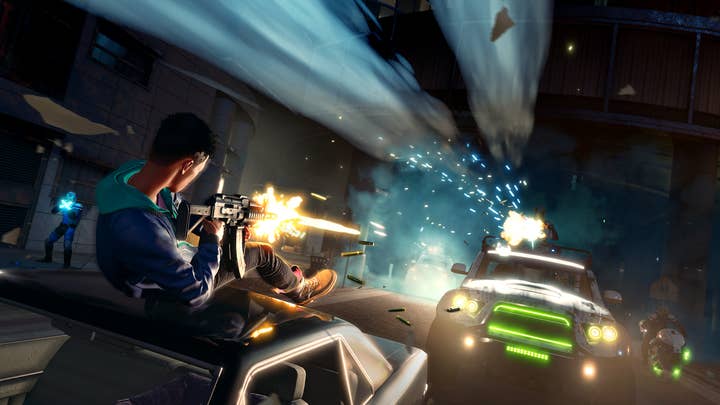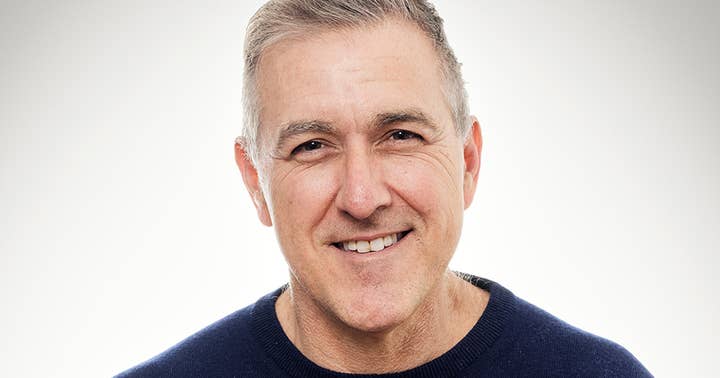Saber's Matthew Karch: "Don't bet against Embracer"
Studio founder shares his view of the story behind Embracer's struggles, and why he's bullish on the group's recovery
Sign up for the GI Daily here to get the biggest news straight to your inbox
Embracer Group has become a cautionary tale for the games industry; the poster child of what happens when a business grows too big, too quickly.
But Saber Interactive founder Matthew Karch — previously on the leadership team at Embracer, and now head of Beacon Interactive, which purchased Saber and various studios from Embracer for $247 million last month — believes criticism of the company has been too harsh and that the group did a good job of minimising the cuts made in the past year.
"There was a long time when Lars [Wingefors, Embracer CEO] was kind of a wonder child," Karch tells GamesIndustry.biz. "He could do no wrong, he was on the cover of magazines and Lars is a pretty humble guy. It's not like he takes all of his money and spends it. Yes, he's bought a few things that people with wealth can buy but he's been very maligned – in Sweden in particular.
"First, he was maligned for actually being wealthy and then he was maligned for the fact that the Embracer shares haven't really held up over the past year. In fact, they dropped significantly and precipitously and I think it actually dropped more on a relative basis than almost anybody else primarily because it seems to be a company these days that everyone likes to pick on.
"We were getting congratulated left and right at GDC about leaving the evil Embracer. But these are the nicest people you've ever met"
"But in my mind, nobody has been guided by more of a sense of fairness and reasonableness than Lars. The process that we've had to go through to terminate studios has absolutely been... it's killed us. I say 'us' even though I'm no longer part of the company because I feel like… I mean, I still have shares, I still have close relationships and good friends, and obviously the best wishes that they succeed over there. But I would say Embracer tried harder than anybody to save as many jobs as it could."
Karch adds that the fact Embracer grew so big within just a few short years meant that it also had to act just as quickly when it came to staff reductions. He also argues that the layoffs "weren't any worse or more significant than you saw in any other situation" - although Embracer is one of a handful of games companies that has laid off more than 1,000 people, alongside the likes of Unity and Microsoft.
"Look at Gearbox. Gearbox just sold, right? The employees that were within that company remained in that company until after the announcement, right? Because Lars didn't want to let anybody go, he really wanted to keep everybody. So I think he gets a bad rap.
"We were getting congratulated left and right at GDC about leaving the evil Embracer. But these are the nicest people you've ever met. Lars has an archive of video games. He loves games. He lives for games. He's not a suit, even though he wears them for the stock market presentations, he's a games guy.
"Embracer assembled some of the greatest assets in the history of the industry and they still have retained a tremendous number of them," he continues, citing Tomb Raider, Lord of the Rings, the revitalised Dead Island, and Remnant as a handful of examples. "The problem is sometimes that gets bogged down by other stuff that is expensive and less certain, and when you're so big, it takes a while to take stock of everything that you have. If you look at Embracer right now, I would say the assets that Embracer has are worth three or four times what their market cap is."
He adds: "I think it's been a real challenge, and I think it's been sad actually."
It's worth noting that Gearbox has confirmed there have been layoffs following the $460 million sale to Take-Two since we spoke to Karch.
"[Embracer] we kind of backed ourselves into a corner. The company didn't really need that $2 billion deal"
Karch joined the Embracer board after Saber Interactive sold to the group in 2020. He then stepped down as both a board member for Embracer and CEO for Saber Interactive in June 2023, taking on the role of interim chief operating officer at Embracer shortly after the group announced it was restructuring — a process that Wingefors has now said is completed following more than 1,400 layoffs and the closure of three studios. The remaining Embracer Group has 111 internal development studios and over 12,000 employees.
As has been well documented at this point, the restructure was triggered by the collapse of a deal with an external investor that would have been worth at least $2 billion.
"When we lost that transformational deal back in May of last year – I don't know if it was ever officially disclosed as Savvy or not – it was very clear to me as somebody who was on the board of Embracer that we were going to need to make significant changes," Karch tells us.
"There were a few factors that were at play. I would say the biggest factor was probably that the market had shifted. There was a period of time when there was such enthusiasm about the game sector that raising capital was easy with a strong share price and Embracer had a strong share price. But as interest rates started to rise and people started to pull their money out of the markets, and as cash became more important, there was a lack of confidence or a lack of patience for companies that had investments that were long term into video games."
The situation was not helped by the fact that some of Embracer's biggest releases had not been as successful as management had hoped. The prime example was Volition's 2022 Saints Row revival, although Karch adds he "wasn't surprised" that this failed to meet expectations.
The acquisition of French tabletop specialist Asmodee in 2021 was another key factor. At €2.75 billion, it was one of the most expensive purchases Embracer had made and the ninth it had announced that year. This deal pushed Embracer Group into debt for the first time, says Karch.
"When that happens, all of a sudden the dynamic changes. You no longer have that recourse to go into the market and, and raise capital," he says, adding: "The debt combined with a relatively lowish cash flow and I wouldn't say an inability to go out and raise capital at the share price, but a reluctance to do that because why would you want to dilute the value of your shares and those of your shareholders by raising capital at a super low price? And so there was a reluctance to do that to as great a degree as possible. And that meant ultimately that cuts needed to be made."

Embracer's decentralised structure also worked against it. With a more centralised organisation, it would have been easier and quicker for management to identify the cuts it wanted to make and implement them; with each of Embracer's 12 operating groups was responsible for their own businesses and teams, the process was much more complex.
The Savvy deal would have secured significant cash flows, but without it, Karch says it was "no longer sustainable" to invest in all the games that were in the works across the various operating groups.
"I believe we kind of backed ourselves into a corner," he says. "The company didn't really need that deal. There's pressures from the market to continually grow and to grow fast, and those market pressures sometimes can impact the way you perceive things and judge them.
"Embracer was run by multiple companies doing multiple deals, right? There was Saber, there was Gearbox, Crystal Dynamics, Eidos, THQ, Plaion, and in a normal scenario, everyone would go about doing their own business and getting their own deals signed. But there was an opportunity that presented itself to do a larger deal that would have procured significant cash flows and done it in a way where there was more certainty as opposed to having 12 different verticals going out and doing their own business development."
But the deal with Savvy took "a lot longer than expected," and while it was still pending, each of Embracer's groups had to put their own business development on hold, limiting the company's options.
" I wouldn't bet against Lars right now. He's really on top of it. I haven't heard him this confident in a long time"
"There was a lot of certainty that [the deal] was going to happen," Karch says. "It was basically placing too big of a bet on something that ultimately ended up not materializing for one reason or another. But had that not been the case, a lot of those games would have ended up being signed with other partners and the situation would have been significantly improved over where it was.
"It is true that when you gather so many assets so quickly, you have to take a deep breath and take stock of what you have. And I also think that when the markets are supporting this manic kind of growth and you're in a situation where you could take advantage of that, it's hard not to leverage that. It's hard not to leverage a strong share price to go out and buy assets."
Karch also suggests that Embracer Group has been a victim of stock shorting, creating negative sentiments that have driven down the share price. He adds that this, in turn, increases the pressure from external parties, which contributes to the layoffs because "the stock just can't recover from it."
"I blame being a publicly traded company for some of the woes that Embracer has. And I blame the fact that people are trying to take advantage of other people's misery through shorting the stock as something that has resulted in a depressed share price for the company and thus some of the layoffs.
"But I wouldn't bet against Lars right now. He's really on top of it. I haven't heard him this confident in a long time and I think they've made the company small enough – still big, but small enough – that it's manageable... They have some great stuff that I know of in the works that's unannounced that I think people are gonna love. So I'm bullish on them. I love them and it was a bittersweet thing for me to go, but it happened. I think they're a great company and I think they're really, really great people. I just feel badly that the last year has been so stressful – it's been stressful for me too."
We'll have more from our interview with Karch soon, including why Saber Interactive originally sold to Embracer, how he bought the company back, and what the future holds for both Saber and new parent Beacon Interactive.
Sign up for the GI Daily here to get the biggest news straight to your inbox









